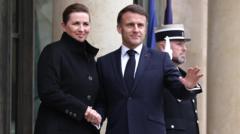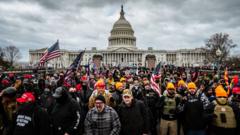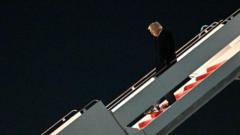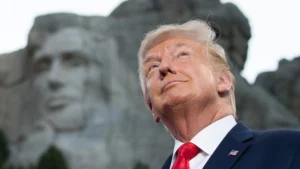Recently, the intersection of Donald Trump's business dealings and the cryptocurrency industry has raised alarm among ethics experts. Chinese entrepreneur Justin Sun's $30 million investment into a struggling crypto firm, linked to Trump, has augmented concerns regarding the former president's potential conflicts of interest as he prepares for his return to the White House.
Trump's Crypto Ventures Raise Ethical Concerns as Investment Opportunities Multiply

Trump's Crypto Ventures Raise Ethical Concerns as Investment Opportunities Multiply
The intertwining of Donald Trump's business interests and crypto investments has sparked debates about potential conflicts of interest and regulatory influence.
In a captivating series of events, Chinese crypto entrepreneur Justin Sun, after making headlines for purchasing a $6.2 million banana as part of a publicity stunt, has further drawn attention with his $30 million investment in World Liberty Financial, a cryptocurrency firm struggling to gain traction since its launch. This investment is particularly noteworthy as it enables direct benefits for Donald Trump, whose involvement with the firm allows him and his family to potentially earn around $20 million, signaling a new chapter in the fusion of politics and business.
Sun, currently embroiled in fraud litigation in the U.S., has yet to clarify his intentions behind the investment, which is characterized by tokens that cannot be traded, adding a layer of intrigue. The development has alarmed government ethics experts, marking a concerning trend whereby Trump's expanding business ventures may create avenues for individuals and entities seeking to influence U.S. policy to funnel resources toward him.
Richard Painter, an ethics advocate and former White House chief ethics lawyer under George W. Bush, remarked on the increasing conflicts arising from Trump's business empire, particularly as it now encompasses a publicly traded social media platform, crypto investments, and partnerships with international stakeholders. The ambiguous nature of these transactions has led many to wonder how they might intertwine with his public service duties.
Past experiences during Trump's first term bear resemblance to the ongoing scrutiny; for instance, the Trump International Hotel became synonymous with ethical dilemmas, as foreign officials and lobbyists flocked there, raising questions regarding emoluments and indirect profits tied to his presidential role.
In response to ongoing ethical scrutiny, Trump's team asserts that he distanced himself from his extensive business portfolio when he became president and has undertaken political actions out of a genuine commitment to public service. However, critics posit that the evolution of Trump's business engagements has made it easier than ever for various entities to financially interact with him in subtle ways.
The growing influence of Bitcoin and cryptocurrency in the American financial fabric has further complicated matters. Trump's recent overtures toward crypto regulation, including a potential national Bitcoin reserve, underscore his dual role as a businessman and public figure whose decisions will inevitably impact his fortune.
Experts caution that the very structure of current U.S. law allows for limited conflict-of-interest oversight, as presidents operate under a unique set of rules that diverges from the regulations governing other government officials. The precedent that Trump sets could usher in a new era of political fundraising tied intricately to business affiliations.
As the situation evolves, the ramifications of Trump's relationships with the crypto world are still unfolding—an ambiguity inherent in a leader whose financial interests are closely woven into the political landscape, and who has seemingly opened doors to unregulated financial maneuvers that future presidents might well emulate.





















